June 2, 2025 | 00:53 GMT +7
June 2, 2025 | 00:53 GMT +7
Hotline: 0913.378.918
June 2, 2025 | 00:53 GMT +7
Hotline: 0913.378.918
With nearly 1,000 species of rare medicinal plants, Nghe An has one of the richest sources of medicinal herbs in the country, distributed mainly in mountainous districts such as Ky Son, Tuong Duong, Con Cuong, Que Phong, Quy Chau, Quy Hop... In recent years, growing and processing medicinal plants has gradually become a direction that contributes to increasing income for people in mountainous districts, especially high mountain areas.
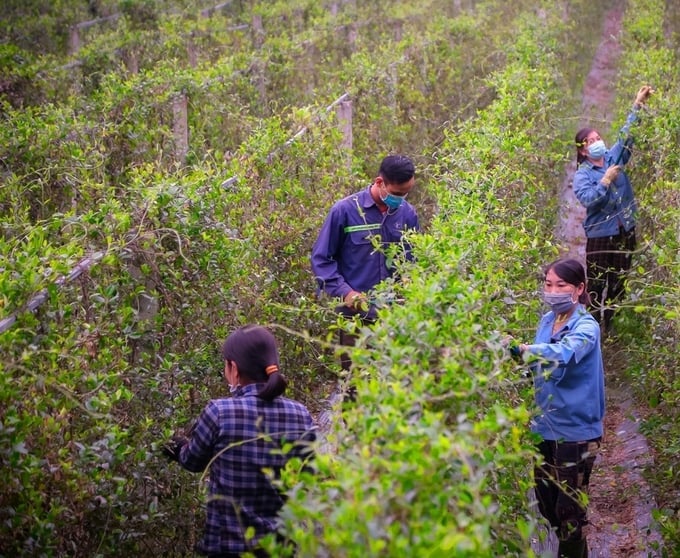
The staff of Pu Mat Pharmaceutical Joint Stock Company (Con Cuong district) collect medicinal plants. Photo: Dao Tuan.
Mr Lu Van Tiep in Canh Toong village, Yen Tinh commune (Tuong Duong district) said: His family is one of two households in the village that planted 5 ha of tea trees in August 2022. This plant grows very quickly, can be nursed or sown and can be harvested after only 4 months. On average, 15kg of fresh tea leaves after being dried or sun-dried yields 1kg of dried tea, the current selling price is VND 250,000/kg, and his family earns VND 1 million each week. Green tea after harvest only needs to be washed, dried and packaged, a process anyone can follow, including small children.
Mr Pay Van Bay, an officer in charge of agriculture in Yen Tinh commune, said: In all natural forest areas managed by the commune, there are scattered tea trees growing. Previously, the uses of this tea plant in preventing and treating digestive diseases (stomach, duodenum...), problems relating to bones and joints, and its use in sedation, rejuvenation, and detoxification... were unknown so no one cared.
Currently, the Commune People's Committee has a plan to cultivate, protect and develop the tea tree into a special local product. Seeing clearly the effect and efficiency, villagers have converted many areas of land planted with other ineffective crops to growing tea trees, which bring high income.
In Yen Hoa commune (Tuong Duong district), there are currently 10 ha of medicinal plants grown concentrated in 4 villages, including Cooc, Yen Hop, Yen Dinh and Yen Tan villages. Of the 10 ha mentioned above, there are 3 ha of yellow flower tea trees and 7 ha of Ardisia Sylvestris Pitard trees. According to traditional medicine, the leaves of the Ardisia Sylvestris are effective in treating stomach pain and controlling symptoms such as belching, heartburn, epigastric burning, bloating, and indigestion, bloating...
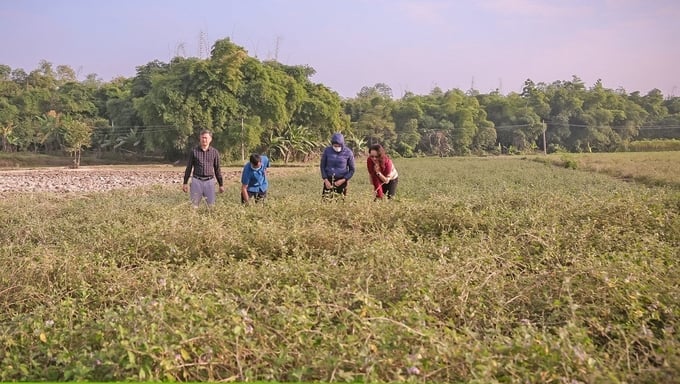
Solanum procumbens field in village 2-9, Chau Khe commune, Con Cuong district, Nghe An. Photo: Dao Tuan.
Mr. Le Van Thin - Cell Secretary of Cooc village said that when the commune had a policy to develop medicinal plants, the villagers responded very positively. Particularly, the Ardisia Sylvestris tree can be intercropped under the forest canopy, with a short duration from planting to harvest. The selling price per kilogram of fresh Ardisia Sylvestris leaves ranges from VND 20,000 - 30,000, depending on the quality of the leaves. Dried Pomegranate leaves are priced at VND 180,000 - 200,000/kg. Thus, on average, 1 ha of Ardisia Sylvestris trees yield an income of over VND 40 million/harvest, harvested 3 times a year, bringing in an income of VND 80 - 120 million.
In the Con Cuong district, in recent years, people have had a movement to grow and process medicinal plants. Medicinal plants are new crops that can be grown and harvested all year round and actually yield higher income than many other types of plants.
Mr. Luong Dinh Viet - Vice Chairman of the Con Cuong District People's Committee shared: The district has built a 23-ha medicinal plant growing area, concentrated in the communes of Lang Khe, Chau Khe, Chi Khe and Thach Ngan with plants such as climbing nightshade, Gymnema sylvestre, wild bitter melon, polyscias fruticosa... All products sold by people to Pu Mat Pharmaceutical Joint Stock Company. Compared to corn or sugarcane on highlands, growing medicinal plants is both stable and gives 1.5 - 2 times higher income, with investment costs lower than other crops.
Particularly, Puxailaileng ginseng was discovered on Puxailaileng mountain at an altitude of 2700m. This ginseng variety is assessed by pharmaceutical industry experts to be of equal quality to Ngoc Linh ginseng in Kon Tum. Currently, this ginseng variety is being propagated from cell tissue with a success rate of over 30%.
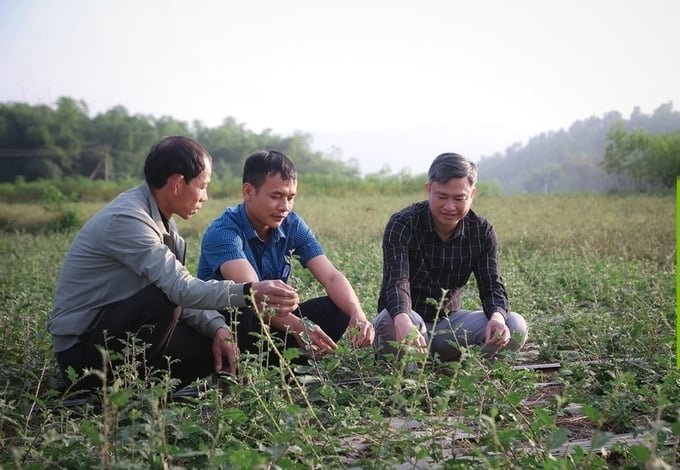
There are great conditions and potential, but the development of medicinal plants in Nghe An still faces many difficulties. Photo: Dao Tuan.
To promote the value of medicinal plants, in 2013, Nghe An Provincial People's Committee approved a framework project for provincial-level genetic resource conservation tasks to be implemented in the period 2014 - 2020. In particular, 34 animal, plant and microbial genetic resources are included in the list for conservation in each stage.
Medicinal plants bring a good source of income, contributing to hunger eradication and poverty reduction for many people in the mountainous districts of Nghe An.
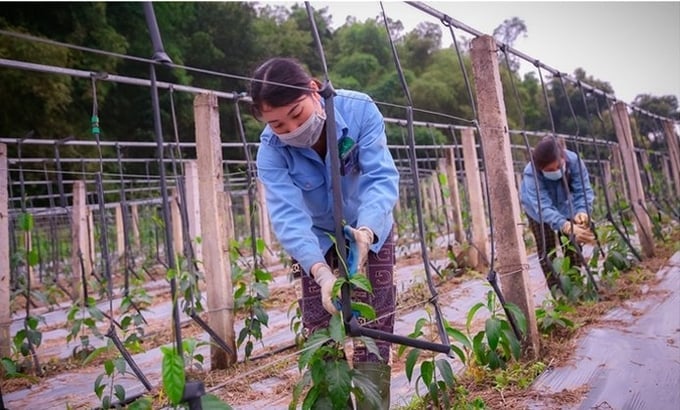
Nghe An currently has a number of units and businesses investing and collaborating in the production and processing of medicinal plants, but the scale is still small. Photo: Dao Tuan.
Mr. Phan Xuan Dien - Director of Pu Mat Pharmaceutical Joint Stock Company (Con Cuong district) said that, currently, the enterprise has only linked up with 100 households in communes in the district to create raw material areas. The Company is unable to expand the area to many other localities due to many reasons.
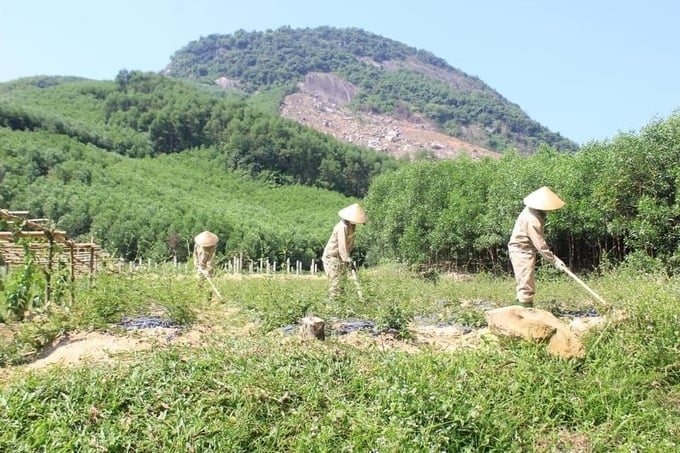
Medicinal plant garden of Tinh Sang Duong Agrochemical Cooperative (Hop Thanh hamlet, Yen Hop commune, Quy Hop, Nghe An). Photo: Phuong Anh.
According to Mr Dien, in order to produce, process and trade medicinal plant products sustainably, the most important thing is to have a connection between businesses and businesses and between businesses and people through intermediary organizations such as cooperatives, groups, and production teams... However, this connection is still very loose, easily causing a situation of over-producing, causing a backlog and difficulty in consumption; and another situation where there are too few products in stock to serve demand...
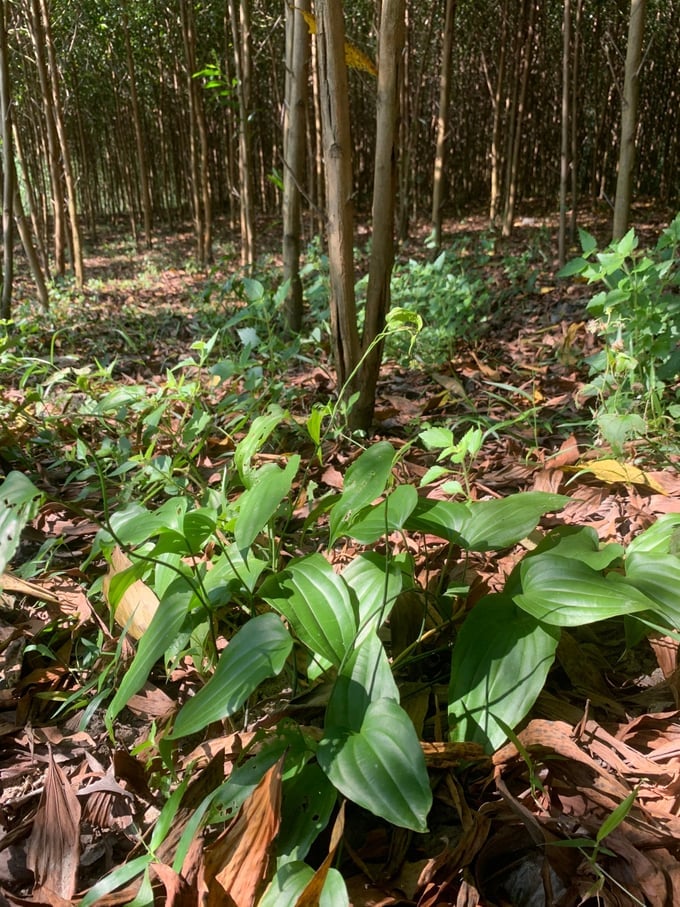
Planting Stemona tuberosa trees under the forest canopy in Yen Hop commune (Quy Hop, Nghe An). Photo: Phuong Anh.
Translated by Hoang Duy

(VAN) Several scientists and farmers are experimenting with soil treatment in some key durian-growing regions such as Cai Lay (Tien Giang), Dak Song, Gia Nghia, and Dak R’lap (Dak Nong).
/2025/05/25/4127-3-073637_820.jpg)
(VAN) Thanks to the promotion from an FAO-implemented project, vegetable production in greenhouses in Moc Chau has seen strong development, from 1.5 hectares in 2021 to nearly 50 hectares in 2024.

(VAN) FAO has recently supported USD 140,000 to implement the project 'Risk mitigation human-animal interface risks through disease control initiatives in pig farming.'

(VAN) The People's Committee of Tra Vinh province has approved an adjustment to the investment policy for the Green Hydrogen Plant project, increasing its area to approximately 52.76 hectares.
![Reducing emissions from rice fields: [2] Farmers’ commitment to the soil](https://t.ex-cdn.com/nongnghiepmoitruong.vn/608w/files/news/2025/05/05/dsc08881jpg-nongnghiep-140632.jpg)
(VAN) Clean rice cultivation model in Thuong Tan commune, Bac Tan Uyen district, is assisting local residents in achieving sustainable agriculture by substantially reducing costs, increasing productivity, and protecting the environment.

(VAN) At the conference to disseminate Resolution No. 68, AgriS introduced its digital agricultural ecosystem and reaffirmed its commitment to accompanying the Government in promoting private sector development and sustainable agriculture.

(VAN) 'Blue Ocean - Blue Foods' initiative is designed to restore marine ecosystems and establish sustainable livelihoods for local communities by cultivating a minimum of 1,000 hectares of cottonii seaweed in the first three years.